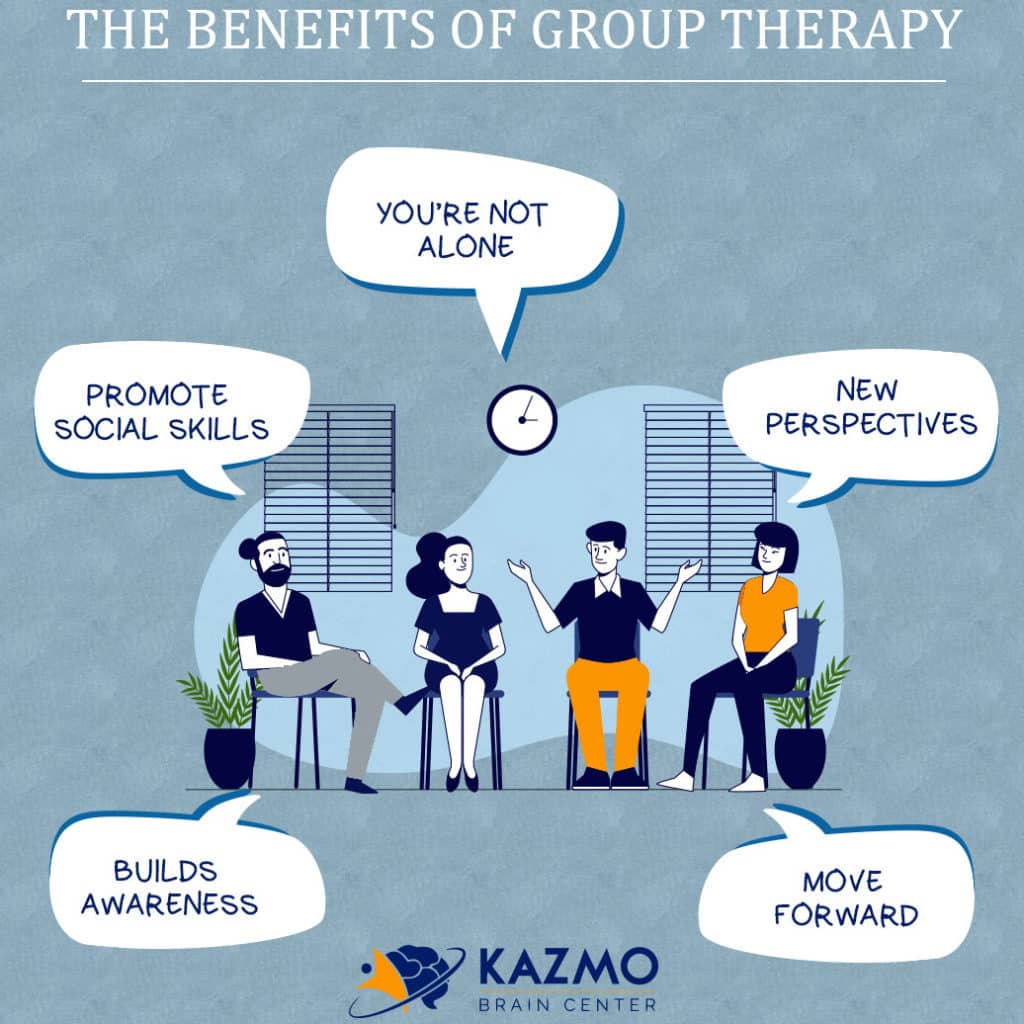Overview
Group therapy is a form of psychotherapy that involves one or more therapists working with several people at the same time. This type of therapy is widely available at a variety of locations including private therapeutic practices, hospitals, mental health clinics and community centers.
Group therapy is sometimes used alone, but it is also commonly integrated into a comprehensive treatment plan that also includes individual therapy and medication.
Who is it for?
Anyone can attend a group therapy session. However, group therapy can be especially helpful for people with limited access to mental healthcare such as those living in rural or low-income areas where healthcare clinics are understaffed or scarce.
One of the goals of group therapy is to bring people who share similar experiences.
Group therapy usually focuses on a specific mental health concern such as social anxiety or depression. Some other examples of conditions a group may focus on include:
- Generalized anxiety disorder
- Post-traumatic stress disorder
- Panic disorder
- Phobias
- Depression
- Attention deficit hyperactivity disorder
- Substance use disorder
- Grief
- Obesity
- Chronic pain
- Weight loss
- Anger management
- Domestic violence
- Cultural trauma
- Chronic illness
Principles of Group Therapy
In The Theory and Practice of Group Psychotherapy, Irvin D. Yalom outlines the key therapeutic principles that have been derived from self-reports from individuals who have been involved in the group therapy process:
- Instills hope: The group contains members at different stages of the treatment process. Seeing people who are coping or recovering gives hope to those at the beginning of the process.
- Universality: Being part of a group of people who have the same experiences helps people see that what they are going through is universal and that they are not alone.
- Imparting information: Group members can help each other by sharing information.
- Altruism: Group members can share their strengths and help others in the group, which can boost self-esteem and confidence.
- The corrective recapitulation of the primary family group: The therapy group is much like a family in some ways. Within the group, each member can explore how childhood experiences contributed to personality and behaviors.
- Development of socialization techniques: The group setting is a great place to practice new behaviors. The setting is safe and supportive, allowing group members to experiment without the fear.
- Imitative behavior: Individuals can model the behavior of other members of the group or observe and imitate the behavior of the therapist.
- Interpersonal learning: By interacting with other people and receiving feedback from the group and the therapist, members of the group can gain a greater understanding of themselves.
- Group cohesiveness: Because the group is united in a common goal, members gain a sense of belonging and acceptance.
- Catharsis: Sharing feelings and experiences with a group of people can help relieve pain, guilt, or stress.
- Existential factors: While working within a group offers support and guidance, group therapy helps members realize that they are responsible for their own lives and actions.
How Group Therapy Works?
Groups can be as small as three or four people, but group therapy sessions often involve around eight to twelve individuals (although it is possible to have more participants). The group typically meets once or twice each week, or more, for an hour or two.
According to author Oded Manor in The Handbook of Psychotherapy, the minimum number of group therapy sessions is usually around six but a full year of sessions is more common. Manor also notes that these meetings may either be open or closed. In open sessions, new participants are welcome to join at any time. In a closed group, only a core group of members are invited to participate.
So what does a typical group therapy session look like? In many cases, the group will meet in a room where the chairs are arranged in a large circle so that each member can see every other person in the group.
The precise manner in which the session is conducted depends largely on the goals of the group and the style of the therapist. Some therapists might encourage a more free-form style of dialogue, where each member participates as he or she sees fit. Other therapists instead have a specific plan for each session that might include having clients practice new skills with other members of the group.
Different Types of Group Therapy
There are several different types of group therapy and treatment models vary from group to group.
The following sections will outline five of the most common types of group therapy.
Psychoeducational Groups
Psychoeducational group therapy focuses on educating members about their conditions and providing them with new coping strategies. These groups usually focus on a specific condition such as substance use disorder, anxiety or phobias.
Skills Development Groups
Skills development groups focus on introducing and improving the skills that members need to cope with certain mental health conditions. These groups may incorporate aspects of psychoeducational groups.
Still, the overall goal involves strengthening the members’ behavioral and cognitive resources to help them make positive choices and avoid harmful situations.
Cognitive Behavioral Groups
Cognitive behavioral group therapy attempts to restructure the beliefs a person has that lead to negative or harmful behaviors.
For example, cognitive behavioral groups that focus on substance use disorder begin by identifying situations and environments that trigger addictive behavior. With this understanding, members can develop management strategies that support reduced use.
Support Groups
Support groups can help people cope with significant life changes such as the loss of a loved one. In support groups, members give and receive unconditional acceptance. The group also encourages its members to reflect on their personal beliefs and behaviors.
Interpersonal Process Groups
The interpersonal process group model uses the psychodynamic approach to promote positive change. Psychodynamics is a school of psychology that views a person’s early life experiences and subconscious beliefs and feelings as the foundation of their personality and behaviors.
Interpersonal process groups focus more on interpersonal group dynamics and less on individual psychology.
Effectiveness
Group therapy can be effective for depression. In a study published in 2014, researchers analyzed what happened when individuals with depression received group cognitive behavioral therapy. They found that 44% of the patients reported significant improvements. The drop rate for group treatment was high, however, as almost 1 in 5 patients quit treatment.
An article published in the American Psychological Association’s Monitor on Psychology suggests that group therapy also meets efficacy standards established by the Society of Clinical Psychology (Division 12 of the APA) for panic disorder, bipolar disorder, obsessive-compulsive disorder, social phobia and substance use.
Benefits of Group Therapy

According to The Theory and Practice of Group Psychotherapy Fourth Edition, group therapy may provide:
- a safe place for people to share their feelings and explore the nature of their mental health condition
- a place to receive support from and give support to others who are experiencing similar difficulties
- exposure to new behaviors, thoughts, and beliefs that may shift people’s perspectives
- a place where people feel that they are not alone
- positive support systems
- a more affordable alternative to one-on-one therapy sessions
Summary
Group therapy offers an alternative to individual therapy.
In group therapy sessions, people can meet others who share similar experiences. One or more certified psychologists or other mental healthcare practitioners lead group therapy sessions.
There are many different types of group therapy models. However, most groups tend to focus on introducing members to new, more positive behaviors so that they can better cope with significant life events and mental health symptoms.
Dr. Leza (Reza) Kazemi-Mohammadi, is the Kazmo Brain Center Director and Licensed Professional Counselor Supervisor, and he uses group therapy techniques. Request an Appointment at Kazmo Brain Center located in Frisco, Texas for more information about group therapy.
Resource:
medicalnewstoday.com
verywellmind.com






